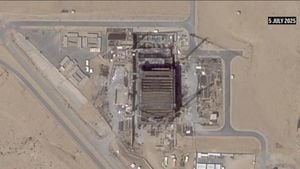In a dramatic escalation of tensions between two North African neighbors, Mali has filed a formal case against Algeria at the International Court of Justice (ICJ), accusing its northern neighbor of aggression after Algerian forces shot down a Malian military reconnaissance drone near their shared desert border. The incident, which took place on the night between March 31 and April 1, 2025, near Tinzaouaten in Mali's Kidal region, has triggered a diplomatic crisis that has seen both countries recall their ambassadors and close their airspace to each other, according to reports from Reuters, the Associated Press, and other major news outlets.
Mali's Ministry of Territorial Administration announced on September 4, 2025, that it had "submitted an application instituting proceedings against Algeria before the International Court of Justice." The Malian government alleges that Algerian forces deliberately shot down the drone to obstruct Malian military operations against armed groups in the border region. In a strongly worded statement, Malian authorities described the destruction of the drone as "not only an aggression, a hostile act, but also a blatant violation of the principle of non-use of force and an act of aggression." The statement continued, "This flagrant aggression is the culmination of a series of hostile acts and clearly demonstrates an unhealthy collusion between terrorists and the Algerian regime."
Algeria, for its part, has rejected Mali's accusations. The Algerian defense ministry claimed that its forces shot down an armed surveillance drone that had violated Algerian airspace near the border. The Algerian army announced shortly after the incident that the drone had entered its airspace near Tin Zaouatine, a border town known as a stronghold for Tuareg separatists opposed to Mali’s government. Algeria has cited defense ministry radar data as evidence, but according to Mali, repeated requests for proof from Algerian authorities that the drone had entered Algerian airspace have gone unanswered.
The confrontation has quickly spiraled into a full-blown diplomatic standoff. Both countries have recalled their ambassadors, and airspace between Mali and Algeria has been closed—a significant gesture in a region where cross-border military operations and cooperation have often been necessary to combat the persistent threat of armed insurgencies. According to AP, Mali’s government views the drone’s destruction as "premeditated" and intended to hinder its ongoing military campaign against armed rebels, some of whom are linked to al-Qaida and the Islamic State group.
This latest episode comes against a backdrop of deteriorating relations between Mali and Algeria. Once, Algeria played the role of mediator in Mali’s internal conflicts, notably brokering the 2015 peace agreement between Mali’s government and Tuareg separatists. But in January 2024, Mali’s junta scrapped that peace deal, alleging Algerian proximity to terrorist groups operating near the shared border. The Malian government has repeatedly accused Algeria of maintaining ties with armed groups in the region, further souring relations and fueling mutual suspicion.
In its ICJ application, Mali argued that the drone was still within Malian territory when it was shot down, making the incident a breach of Malian airspace and sovereignty. The government characterized the downing as "the culmination of a series of hostile acts and malicious actions, repeatedly denounced by the Malian authorities." The statement added, "This blatant aggression, which the government strongly denounces and whose aim was to hinder the neutralisation of armed terrorist groups by the Malian Armed and Security Forces, is the culmination of a series of hostile acts and malicious actions." Mali further contends that Algeria’s actions violate the principle of non-use of force enshrined in international law.
Algeria, however, has consistently maintained that it acted in self-defense, asserting that the Malian drone had crossed into Algerian airspace. The Algerian government has not publicly responded in detail to Mali’s ICJ filing, but previous statements from its defense ministry have emphasized the right to protect national airspace, especially in a region rife with instability and cross-border threats.
The timing of the incident is notable, as Mali, alongside its neighbors Burkina Faso and Niger, has struggled for years to contain a brutal insurgency by armed groups, including some aligned with global jihadist organizations. Following two military coups in 2020 and 2021, Mali’s ruling junta expelled French troops and turned to Russia for security assistance. Despite these shifts, the security situation in Mali remains precarious, with attacks by extremist groups intensifying in recent months, according to AP.
The diplomatic rupture with Algeria adds a new layer of complexity to Mali’s security challenges. Algeria boasts one of Africa’s largest militaries and has long seen itself as a regional power. Yet, the military-led governments in Mali and Niger have increasingly sought to chart their own course, distancing themselves from traditional partners and seeking new alliances, notably with Russia. The closure of diplomatic and air links between Mali and Algeria could complicate efforts to coordinate border security and share intelligence at a time when cross-border militant activity shows no signs of abating.
Beyond the immediate military and diplomatic fallout, the case before the International Court of Justice carries broader implications for international law and the norms governing the use of force. Mali’s argument hinges on the principle of non-use of force—a cornerstone of the United Nations Charter—while Algeria’s defense rests on the right to territorial integrity and self-defense. The ICJ, headquartered in The Hague, will now be tasked with weighing the competing claims and evidence, a process that could take months or even years to resolve.
Observers note that this is not the first time military technology has sparked controversy in the Sahel. The proliferation of drones and surveillance equipment has raised new questions about sovereignty, accountability, and the risks of miscalculation in a region already beset by violence and mistrust. As both Mali and Algeria dig in their heels, the international community will be watching closely to see whether legal proceedings can help de-escalate tensions or whether the standoff will further destabilize an already volatile part of Africa.
For now, the shooting down of a single drone has exposed deep fractures between two key players in the Sahel. As the case moves to the world’s highest court, the outcome could set a precedent for how nations respond to perceived threats—and how far they are willing to go to defend their sovereignty in an age of shifting alliances and persistent insecurity.






